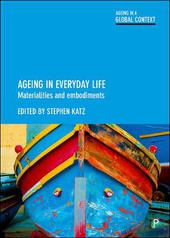
|
Ageing in Everyday Life: Materialities and Embodiments
Hardback
Main Details
| Title |
Ageing in Everyday Life: Materialities and Embodiments
|
| Authors and Contributors |
Contributions by Laura Clarke
|
|
Contributions by Mineko Wada
|
|
Contributions by Kim Sawchuk
|
|
Contributions by Barbara Marshall
|
|
Contributions by Julia M Twigg
|
| Series | Ageing in a Global Context |
|---|
| Physical Properties |
| Format:Hardback | | Pages:240 | | Dimensions(mm): Height 234,Width 156 |
|
| ISBN/Barcode |
9781447335917
|
| Classifications | Dewey:305.26 |
|---|
| Audience | | Professional & Vocational | | General | |
|---|
| Illustrations |
No
|
|
Publishing Details |
| Publisher |
Bristol University Press
|
| Imprint |
Policy Press
|
| Publication Date |
10 June 2018 |
| Publication Country |
United Kingdom
|
Description
Applying interdisciplinary perspectives about everyday life to vital issues in the lives of older people, this book maps together the often taken-for-granted aspects of what it means to age in an ageist society. Part of the Ageing in a Global Context series, the two parts address the materialities and the embodiments of everyday life respectively. Topics covered include household possessions, public and private spaces, older drivers, media representations, dementia care, health-tracking, dress and sexuality. This focus on micro-sociological conditions allows us to rethink key questions which have shaped debates in the social aspects of ageing. International contributions, including from the UK, USA, Sweden and Canada, provide a critical guide to inform thinking and planning our ageing futures.
Author Biography
Stephen Katz is Professor (Emeritus) of Sociology and Distinguished Research Award recipient at Trent University in Peterborough, Canada. He is author of books Disciplining Old Age (1996) and Cultural Aging (2005) and publications on ageing bodies, technologies, critical gerontology, biopolitics, sexuality, and cognitive impairment.
Reviews"This pathbreaking book changes our understandings of contemporary ageing by providing innovative, theoretically-rich analyses of everyday life, meanings and material culture." Dr Sara Arber, Centre for Research on Ageing and Gender, University of Surrey
|